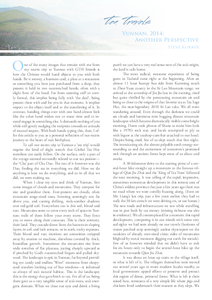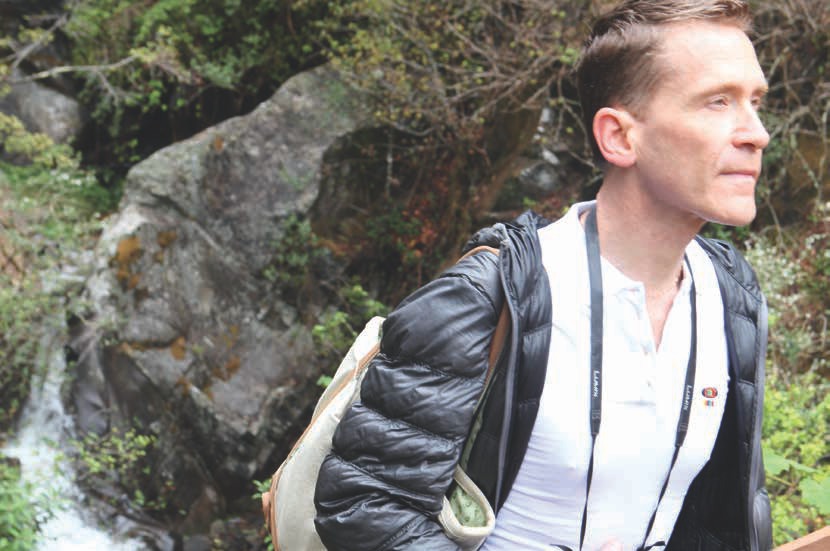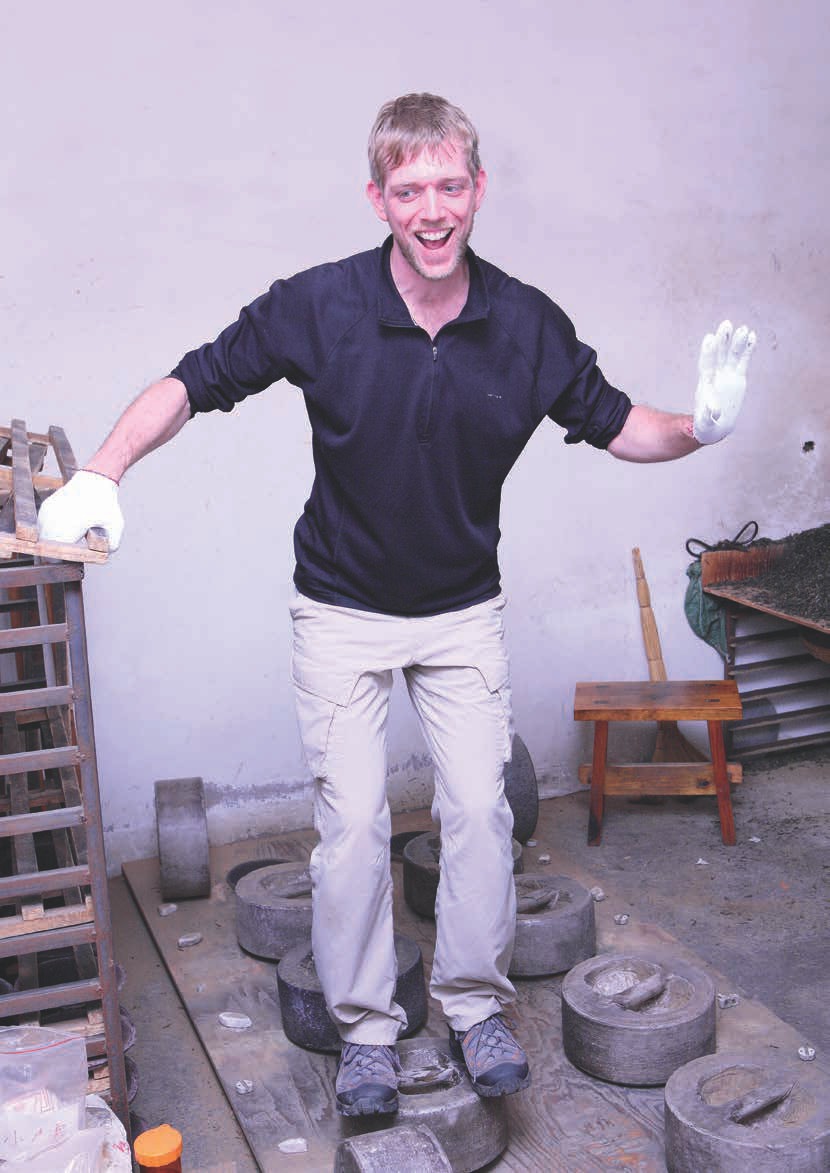
 |
|

One of the many images that remain with me from my recent trip to Yunnan with GTH friends is how the Chinese would hand objects to you with both hands. Be it money, a business card, a plate at a restaurant or something you have just purchased from a shop, they present it held in two outstretched hands, often with a slight bow of the head. Far from seeming stiff or overly formal, this implies being fully with 'the deal', being present there with and for you in that moment. It implies respect to the object itself and to the transferring of it. In contrast, handing things over with one hand almost feels like the other hand wishes not to waste time and to instead engage in something else. It demands nothing of you while still gently nudging the recipient towards an attitude of mutual respect. With both hands typing this, then, I offer this article to you as a personal reflection of our recent journey to the heart of tea's birthplace.
To call our recent trip to Yunnan a 'tea trip' would require the kind of slight stretch that Global Tea Hut members can easily follow. On the surface, only a part of the voyage seemed outwardly related to our tea passion - the 'Cha' part of Cha Dao. The rest of it however was the Dao, finding the tea in everything we did. How we do anything is how we do everything, and so in all that we did, we were making tea.
When I close my eyes and think of Yunnan, first come images of clouds and mountains. They compete for size and grandeur there. Ever-present are clouds, often mountain range-sized ones, hovering seemingly not far above you, and casting shifting, viola-somber shadows over red-gold soil. Everywhere too is this soil, blood and rust. Mountains seem to cover every inch of space in Yunnan; walls of them follow your every move. They force you to move along their contours. This is their territory, their land. They cascade down from the heavens in sloping layers, in soft and lush terraces, or in stark, rocky expanses. Their blood and rust interiors are sometimes stripped away by erosion or machine, elsewhere covered by thick, boundless growth. Sometimes the mountains rise from wide stretches of flat plateaus, jutting sharply upward as if pinched by God's outstretched fingers and pulled skyward. The landscape is epic in Yunnan, far beyond providing eye candy and endless 'Wow!' moments from sleepyeyed travelers looking out of bus windows - it informed us always of tea's natural habitat. This is the landscape; this is the energy that gave birth to tea. For all of us, being there gave us a very tangible sense of tea's roots, tea's energetic domain. When we close our eyes and drink a living puerh we can have a very real sense now of the tea's origin, the land it calls home.
The most radical, awesome experience of being guest in Tealand came right at the beginning. After an almost 11 hour bumpy bus ride from Kunming south to Zhen Yuan county in the Ai Lao Mountain range, we arrived at the township of Jiu Jia late in the evening, tired but quite thrilled by the penetrating mountain air and being so close to the origins of that favorite tea at Tea Sage Hut, the near-legendary 2010 Ai Lao cake. We all went wandering around. Even through the darkness we could see clouds and luminous mist hugging distant mountain landscapes which became dramatically visible come bright morning. Dawn took photos of Shane to make him look like a 1970's rock star, and locals attempted to ply us with liquor at the teashop-cum-bar attached to our hotel. Despite being tired, few of us slept much that first night. The intoxicating air, the almost palpable earth energy surrounding us and the excitement of tomorrow's promised trek through an ancient forest kept most of us abuzz and awake.
A 30-kilometer drive to the starting point of a several-hour hike straight up a mountain to the famous village of Qian Jia Zhai and the 'King of Tea Trees' followed the next morning. It was telling of the rapid, impressive, sometimes monstrous development in this remote area of China's wildest province that just a few years ago there was no road where we were comfily bussing along. (Even on Mr. Liang's last trip, just a few years earlier, they had to walk the 30 km stretch we were driving on, or use horses.) The new roads and infrastructure we saw while travelling was in part built by tea money (mining richness was also in evidence). We all contemplated for a moment this rapid development, comparing it in our minds with some very sad sights we had seen already on our travels (horizons of cranes perched atop seemingly useless skyscrapers on the outskirts of already over-sized cities; sides of mountains blighted by metal monsters digging out earth for metals). Few of us however minded that we didn't have to trek for six hours only to begin the several-hour hike up the mountain towards Qian Jia Zhai.
It was about an hour up stairs to the village itself, or what is left of it. The villagers themselves were moved out several years ago to more modern locales nearby, as local government upped efforts to preserve and protect this region of dense, primeval forest. What is left is their raised huts, remnants of a very simple life where pigs and chickens lived underneath their masters as they slept. We
stopped at a clearing in the woods near these huts and the larger buildings still intact, where locals were cleaning and preparing food. There is still human life there, but it has more to do with forest management and conservation than tea making or daily life.
We all continued sharply upwards - no more stairs - along mountain paths and muddy slopes towards 'the King Tree'. We were all pretty excited to be there, in what appeared to be a Hobbit land. The forest around us was wild, a child's imagination of a magic land where every tree came to life at night and made magic with each other. Tangled, twisting roots, some as thick as the tree trunks they sprung from, others wiry as snakes frozen in time, emerged from the ground to tango upwards and splay out in all directions. There were ancient tea trees, massive, wise magnolias, even schizandra. We kept expecting to see elves emerge from the massive holes inside interconnected tree trunks so wide it would have taken four or five people to wrap around.
As this was so thrilling to us all, most of us chatted a lot on our way up and down: good, deep talks; bonding, memorable ones. Only Wu De remained stalwart in silence throughout, and of course in retrospect this would have been a good cue to follow. These were indeed hallowed lands. This was our time to connect with Tea Spirit in as close proximity to it as we were going to get on this trip and for who knows how long again in our lives?

This was truly a tremendous opportunity to be at one with the kind of jungle-forest which begat our beloved Camellia sinensis. At the end of the road, there was a 2,700 year old tea tree. There are likely dozens of 'King Tea Trees' throughout Yunnan, as every district lays claim to a unique, ancient tree. We heard several times that, well, "This tree is nice, but another one further away is even older..." Even ancient tea trees are subject to human comparisons. I think they pay no mind. Our King Tree was a beauty: around two meters wide, but over 25 meters tall, it is majestic and incredibly elegant, like an aging dancer who has lost none of his grace. The tree was surrounded by a fence to prevent people touching him, but we stood on a wooden platform built to observe in reverent silence. Recording devices were whipped out and aimed towards him, and backs were turned so that smiles could radiate outward from him in selfies and groupies - the usual Western photo op. Yet there was also true reverence there. Silence fell upon us all as we tried to take in what we were seeing: the age, the mystery, the realization that we were all actually there. Mia spontaneously sang a beautiful Argentinian song before the old tree and we all hung in that moment, transfixed. Thanks, Mia!
The next few days saw us processing tea, as well as sampling tea leaves from 1,000 year old tea trees. Wu De was selecting leaves from this magic land for one of the Light Meets Life puerh cakes, soon to be pressed. Anyone who contributes to get one of these cakes will be in for a mind-expanding experience. These teas, even when we all slurped them from bowls with Chinese soup spoons, in a jovial atmosphere and crowded around a wooden table inside a tea storage room, provided us with deeply-felt energetic waves. Stunning tea. Sometimes we would just look at each other on those days and smile, a bit dizzy.
The weather wasn't great for puerh processing (too humid), so we processed the tender, fragrant Ai Lao leaves into red tea on the next day, each one of us sitting with root chakras pressed firmly to concrete in front of a bamboo wicker basket-full of the beauties we knew would eventually be sent around the world to GTH members! We rolled and twisted into large balls these leaves, pressing their juices out, accelerating their oxidation. All this was under the watchful gaze of the beautiful woman who hosted us in Jiu Jia and who ran the tea processing plant, Ai Li Juan. She'd come over to show us how the rolling is really done (it's not easy work!) and comment on the different fragrances which emerged from each pile. This was stunning to us all. Even though we each have shared the mystery and wonder of the same tea brewed by different people turning out so differently; this time, it just didn't make logical sense. How could my pile of leaves smell so very differently from my neighbors' when 'all' that differed was the pair of hands handling them? Fantastic!
Our Chinese and Taiwanese co-rollers were bemused when us Westerners would occasionally just sit and hold our hands over the leaves, eyes closed in meditation, faces either blissfully relaxed or slightly scrunched in serious concentration, trying to feel their Nature energy course through us, or perhaps sending an intention towards them. A few of the Taiwanese tried this out themselves for a few seconds, then giggled, shook their heads and got back to the work at hand. Our gorgeous California sisters sang beautifully as we pushed and rolled, helping the process turn into a happy and focused group ritual, not just a bunch of individual experiences. They also coaxed our host to sing some local songs as we worked, and her lovely voice had us all soar above the mountain ranges visible over our shoulders across the top of the veranda where we sat.
That was not to be our last hands-on opportunity of the trip. A few days later in far away Dali, and rather unexpectedly, we were treated to an impromptu visit to a tea processing factory (Thanks, Mr. Liang!) where we observed puerh cakes being steamed and pressed into bings. I was dazzled by the speed and gong fu skill of the women wrapping the cakes of tea, and by the patience and care involved in wrapping and preparing tongs (seven stacked puerh bings wrapped in bamboo husks). All of our moods were soaring as we got to each press our own cakes then do a hip-swivel dance atop a stone press to compress them. As dizzyingly sexy as Wu De's, Shane's or my bum-balance moves were, Dawn's, Tien's, Mia's and Lindsey's did outsexy ours by a narrow margin in the end. Wu De sealed the end of this perfect day by hand-painting wrappers for each of our cakes.
As you can tell from my already-long but still incomplete description, the Cha part of our trip was amazing! The Dao part was equally, if not more memorable. This is the trickier part to describe, and best left to each traveler to describe his or her own experience. However, everything that was learned about tea but not directly from tea during the trip made us all recall that indeed, 'In everything I do, I'm brewing tea.'
Traveling in groups or on group tours always presents occasions to learn and grow from the accompanying challenges, and everyone on board the Yunnan '14 Happy Bus admirably dealt with all the usual human mini-dramas: the calls to compromise, the need to put aside personal desires in favor of the "general good", bouts of food poisoning and being tired. A little well-timed song, a little altitude sickness-induced head buzz, a dance around central square in a place called Shangri La and a carefree willingness to go along with the flow went a long way towards tempering many irkings of the Little Me. So did reminding ourselves about how very lucky we were to be there, with each other. Ichigo ichie hung over our heads with every turn of a corner revealing breathtaking scenery, as well with every rustling of ego-driven discontent.
Lucky is right. To have such access to lovely souls devoted to Tea Spirit, access to such mind-blowing teas. Lucky to be taken to the clouds and back, to be bathed in the mist which has moistened tea leaves for endless millennia; to be charged by the starlight and mountain energy which has nourished tea trees since way before humanity. Mainly, however, as we do live on this human plane, some of our peak moments of pleasure came in sharing with gorgeous souls the long bus rides, the waits in airports, the pee stop stretches and spontaneous restaurant dancing and giggles over hilariously translated Chinglish. It came in sharing OMG expressions over breathlessly delicious food every single day, in banging temple gongs together, in back rubs and shared stories and emotions, in special moments of human connections with the journey's brothers and sisters...
After the bags are unpacked and the digitized memories sorted, what is left is gratitude. As white and pure as the Guan Yin statue in the middle of the pond we stopped off at in an absurdly stunning national park in northwest Yunnan, impossible neverland of tea, smiling, handsome minorities, clouds and mountains - mountains! Thanks to everyone on the trip for offering themselves, for opening themselves to make the trip the joy it was!

